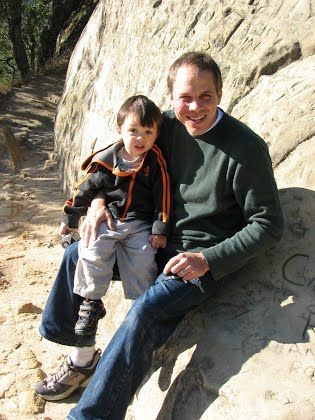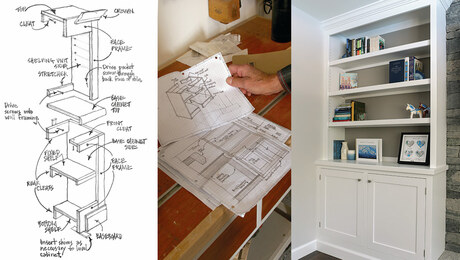
Over the last 10 days I have enjoyed eavesdropping on a compelling conversation between two builders, David Gerstel, author of the seminal, Running a Successful Construction Company, and more recently Crafting the Considerate House, and Michael McVey, an Oakland, Calif., building contractor.
Michael was born in Missouri, where he plied his living as a general contractor in Kansas City. Like other contractors, he enjoyed a swift ride up the economic ladder doing progressively more complex historical renovations. However, Michael had aspirations beyond building, he wanted a life. And when he moved to California, he saw the chance to focus on what’s important. Instead of focusing on building up his business, he decided to focus on keeping it small.
“I am not looking to get big, I am looking only to run a small company well, with a livable income for supporting my family, with a normal workweek, and the ability to take time off for family and personal interests,” Michael told me in an email after I asked why he didn’t want to grow big like everybody else. Nowadays, Michael meters his time just as much as his budget. He explained that his needs were better served when keeping financial ambition in check, “I have no need of a plush lifestyle,” preferring to invest his profits in time to do things like read, write, and contribute to the home education of his son. “The cost of these things is mostly time and attention,” which are not always abundant when you’re chasing an outsized ambition.
The No-Growth Business Plan
On the other end of the email string was David Gerstel, who became a builder-business guru after publishing his book, Running a Successful Construction Company. A book that remains on the business best-seller list since publication in 2002. David lives in semi-retirement nowadays, playing tennis and enjoying the profits he built with a very conservative business plan. He says that, to an extent, he has also followed the no-growth business plan suggested by Michael McVey.
“I started with small jobs and still do them, albeit on my own properties. But when I closed my construction company 20 years ago we were doing multiple million- and multimillion-dollar jobs simultaneously. By then the sweet spot for us had become our extremely restrained overhead and highly developed field skills, which allowed a stress-free operation in any economy. The small-job pocket is a great place to start from, reach out from, and preserve as a fallback,” David wrote, in response to Michael’s comments.
He also pointed out that there existed more than one sweet spot, but for most contractors–both the overly ambitious and those with a life to live–it makes sense to cultivate a small-job division during boom times, when homeowners have a hard time finding a handyman, while also maintaining the smallest overhead possible so that there exists a cash flow basis to sustain you and your business when the next recession comes–and it’s coming.
“A strong foundation in repairs and other small projects can serve one well. It is work that is there in any economy. It’s also a valuable skill, and one that not many contractors have,” Michael added, explaining that in many ways it’s much tougher to find skilled repair contractors than megabuilders eager for the half-million-dollar kitchen remodles. “Service and repair is where a lot of theory gets tested and observed in action, and the proper way to fix problems is not always obvious,” wrote Michael.
The problem comes with image, Michael explained, “Service and repair people like me are easily typecast by their clients. Homeowners don’t always understand the many and subtle observations of repair people, those of us unclogging drains or replacing little areas of peeled paint, having exceedingly valuable insight.” Michael believes that the insight that comes from doing repair work–a firsthand view of what goes wrong when things are not built correctly–is even more valuable for contractor aspiring toward larger projects, “When the data gathered from years of small fixes is not available to the owner, architect, or contractor planning the big remodel, it can result in a very expensive loss.”
So while others strive after a “financial fantasy,” Michael remains, “…quite happy doing ordinary work for people who have less and need less. All I ask of them is to be willing to pay me reasonably to meet my basic livelihood needs. I will never turn down modest jobs that are essential.” He won’t turn down a bigger job, either, but by focusing on the sweet spot between a “cheapskate and luxury builder,” he hopes to maintain that elusive balance between nerve-wracking financial ambition and peaceable quality of life.
Fine Homebuilding Recommended Products
Fine Homebuilding receives a commission for items purchased through links on this site, including Amazon Associates and other affiliate advertising programs.

Handy Heat Gun

8067 All-Weather Flashing Tape

Affordable IR Camera

Michael McVey chose to have the good life now, rather than after he made a lot of money. In the process, he has developed a solid, sustainable general contracting business doing small and moderate jobs. A business model that allows him to spend ample time with his wife Caroline, and two children, Zach and Alina, "enjoying the wonderful parks, nature preserves, museums, and restaurants" where he lives in Oakland, Calif.






















View Comments
Michael, good for you for pursuing what's really important instead of a falsely called "net worth"!
When I was 20 years old, I looked at my life ahead of me, and what people in general typically do: work, work, work, for 40 or 50 years to achieve a retirement when they can then "enjoy life", but then often not having the health or well being to be able to do so.
I determined then at 20, that I wanted to pursue a life style where I could enjoy life throughout my whole lifetime, instead of just at the end of my life.
I am 66 now, and although I may not have the "riches" that many have in their retirement years, and in fact it is likely that I will have to continue do some kind of work, I have no regrets! I have spent most of my life until now, and continue to do so, doing a lot of volunteer work as one of Jehovah's Witnesses, helping others, cultivating relationships with good friends, and enjoying life.
As a consequence, I feel very rich in terms of what's really valuable, and what really counts. Michael, I commend you for doing the same! Keep it up!